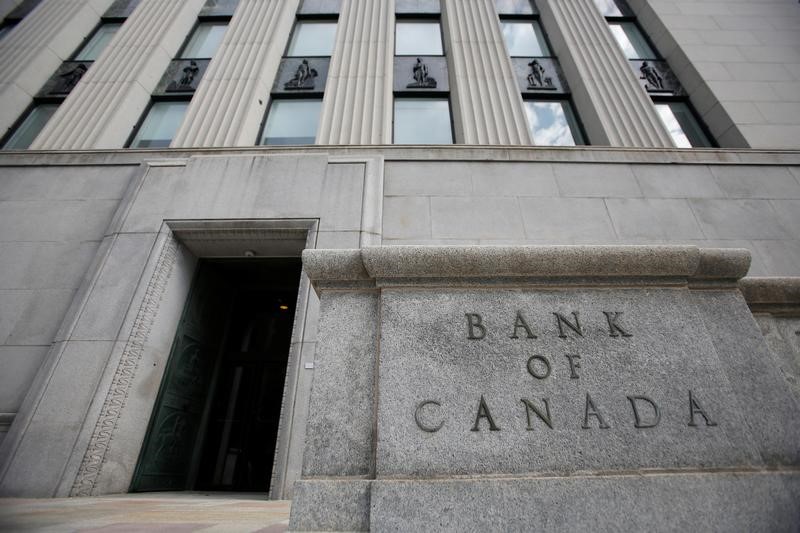By Leah Schnurr and Anu Bararia
OTTAWA/BENGALURU (Reuters) - The Bank of Canada is likely to leave interest rates unchanged at its Sept. 6 meeting and wait until October to raise them, allowing time for more data to show whether still-tame inflation pressure is picking up, a Reuters poll released on Friday showed.
While 24 of 33 economists surveyed in the past few days said an October rate hike was most likely, six forecast rates would rise on Wednesday to 1.0 percent, with several changing their view after a very strong second-quarter gross domestic product (GDP) report.
Another three said the next rate hike would be in January.
The BoC in July raised rates for the first time in seven years, surprising some who thought the central bank lacked inflationary evidence to do so. But the latest poll suggests the decision at this meeting would be more clear-cut.
Roughly two years after Canada's economy was hit hard by a sharp drop in the price of crude, a rebound in the major oil producer has made it the fastest grower among the Group of Seven most industrialized nations.
Second-quarter GDP growth clocked its best rate in nearly six years at an annualized 4.5 percent, topping all forecasts in a Reuters poll.
While that is welcome news, the BoC has a better opportunity to explain its policy in October when it updates its economic forecasts and holds a press conference, said Benjamin Reitzes, senior economist at BMO Capital Markets.
BoC officials have also refrained from making any public speeches since the July rate hike, which was preceded by several hawkish comments.
"With this bank you can't rule anything out. But after the pains they went through to signal July ... and then you get nothing, it just makes it difficult to believe they want to go again," said Reitzes.
While financial market pricing suggests a nearly 50 percent probability of a hike next week from around 20 percent ahead of the GDP figures on Thursday, traders have almost completely priced in a hike by October.
The Reuters poll pegged the odds of a Sept. 6 hike much lower, at 25 percent, and October at 75 percent.
"We expect the September meeting is too soon and the BoC would like to be more gradual," noted Credit Agricole (PA:CAGR) CIB economists Evan Carmean and Michael Carey, who on Friday added an Oct. 25 rate rise to their call.
Any further appreciation in the Canadian dollar, which is up about 9 percent since the start of the year, could also give the central bank reason for pause as that could hurt exports, a sector the bank has long looked to for stronger growth.
Still, analysts at CIBC, Scotiabank and 4CAST brought forward their rate hike forecasts to September after the second-quarter GDP data were published. National Bank, which still expects the BoC to wait until October to move, has penciled in an additional rate hike in December.
The U.S. Federal Reserve is also forecast to raise the federal funds rate again in the fourth quarter. [ECILT/US]
RISKS AHEAD
Several risks may still stand in the way of further BoC policy tightening, most notably a possible correction in a hot housing market and persistently muted consumer price inflation.
Tighter mortgage rules adopted by the government last year, as well as measures including a foreign buyers tax implemented by Ontario earlier this year, have led to a sharp slowdown in Canada's financial capital Toronto.
While chances of the slump spreading nationally are low, another rate hike could depress activity by hurting consumer demand, economists said.
An average Canadian household owed a near-record C$1.67 ($1.35) for every dollar of disposable income in the first quarter, mainly because of mortgage debt.
Inflation, by contrast, has remained lackluster. Although it ticked higher in July, it was still well below the bank's 2 percent target.
Something else that could also disturb the bank's anticipated rate hike path is if the ongoing renegotiation of the North American Free Trade Agreement (NAFTA) turns ugly.
Having implemented anti-dumping duties on Canadian softwood lumber, U.S. President Donald Trump has threatened to terminate NAFTA altogether.
That would likely hurt Canada's economy given the country sends over 75 percent of its exports south of the border.

On an extra question in the survey, 15 out of 25 analysts said they were very or somewhat concerned that Trump would make good on his threat to terminate the trade pact.
(Polling by Anu Bararia; Editing by Ross Finley and Richard Chang)